University Financial Accounting: Fair Value Accounting Analysis Report
VerifiedAdded on 2022/12/15
|10
|2230
|303
Report
AI Summary
This report critically analyzes the concept of fair value accounting, examining its various aspects as presented in the provided academic article. The analysis begins with an introduction to fair value accounting, highlighting its increasing relevance in modern financial reporting, contrasting it with histori...
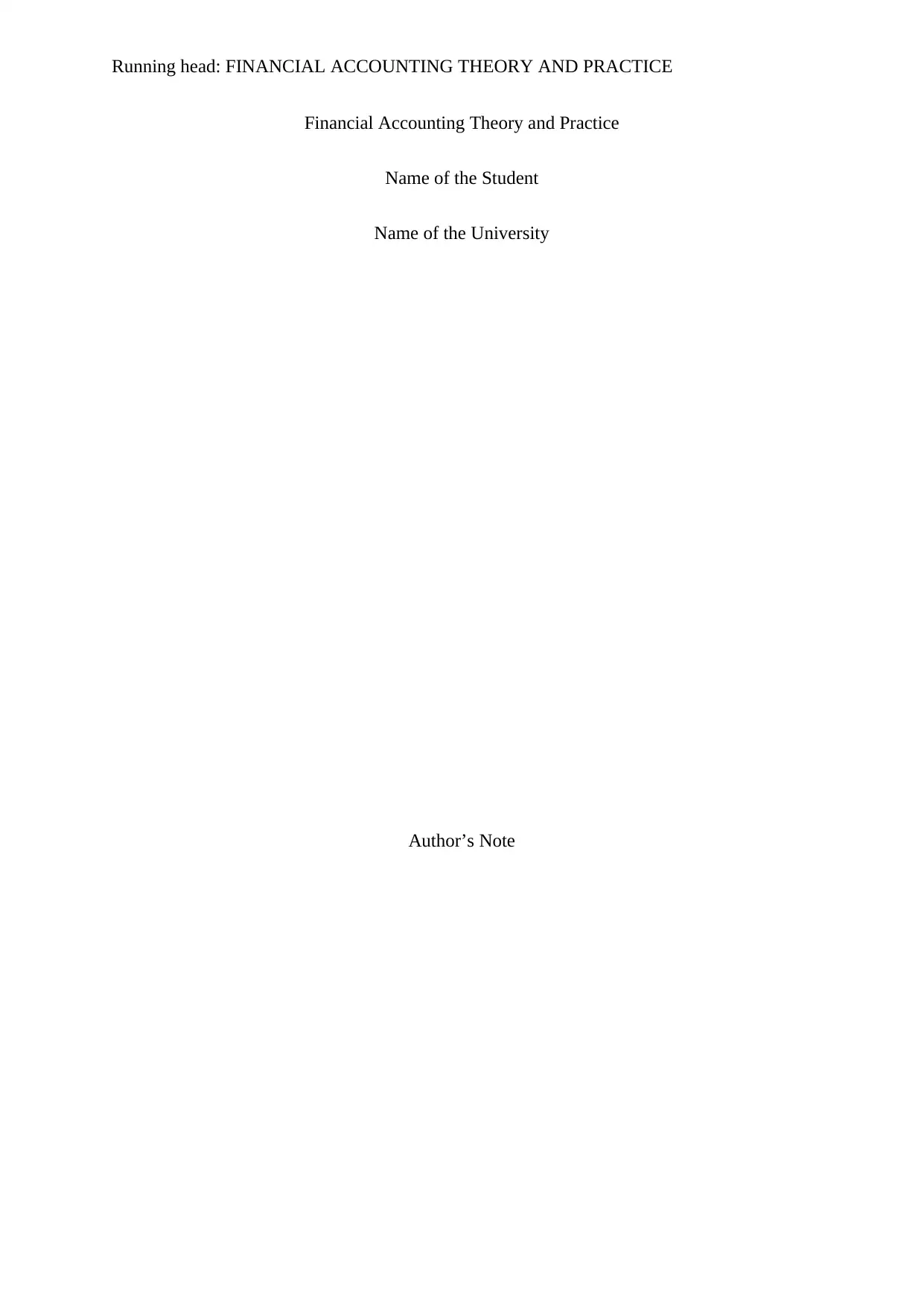
Running head: FINANCIAL ACCOUNTING THEORY AND PRACTICE
Financial Accounting Theory and Practice
Name of the Student
Name of the University
Author’s Note
Financial Accounting Theory and Practice
Name of the Student
Name of the University
Author’s Note
Paraphrase This Document
Need a fresh take? Get an instant paraphrase of this document with our AI Paraphraser
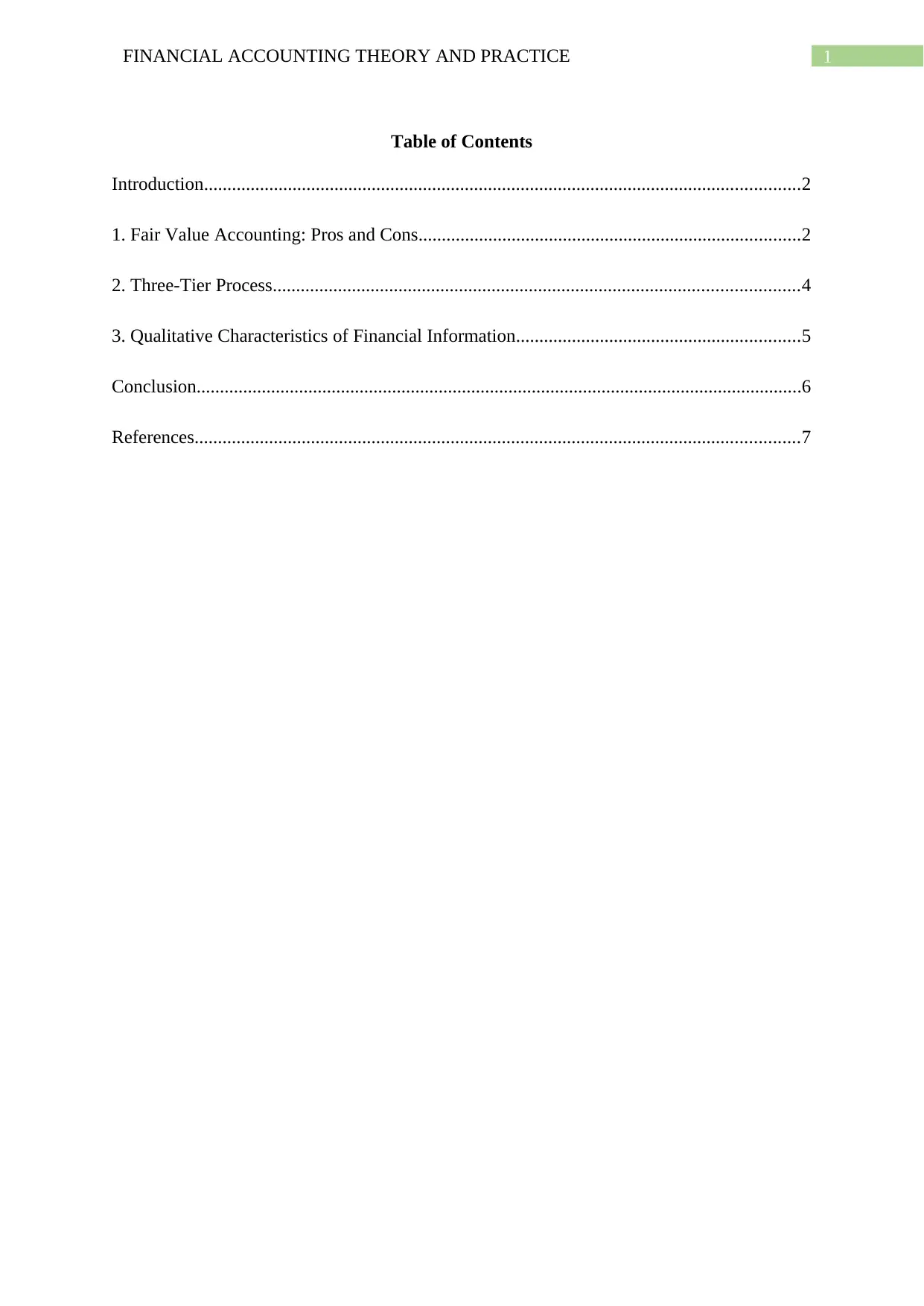
1FINANCIAL ACCOUNTING THEORY AND PRACTICE
Table of Contents
Introduction................................................................................................................................2
1. Fair Value Accounting: Pros and Cons..................................................................................2
2. Three-Tier Process.................................................................................................................4
3. Qualitative Characteristics of Financial Information.............................................................5
Conclusion..................................................................................................................................6
References..................................................................................................................................7
Table of Contents
Introduction................................................................................................................................2
1. Fair Value Accounting: Pros and Cons..................................................................................2
2. Three-Tier Process.................................................................................................................4
3. Qualitative Characteristics of Financial Information.............................................................5
Conclusion..................................................................................................................................6
References..................................................................................................................................7
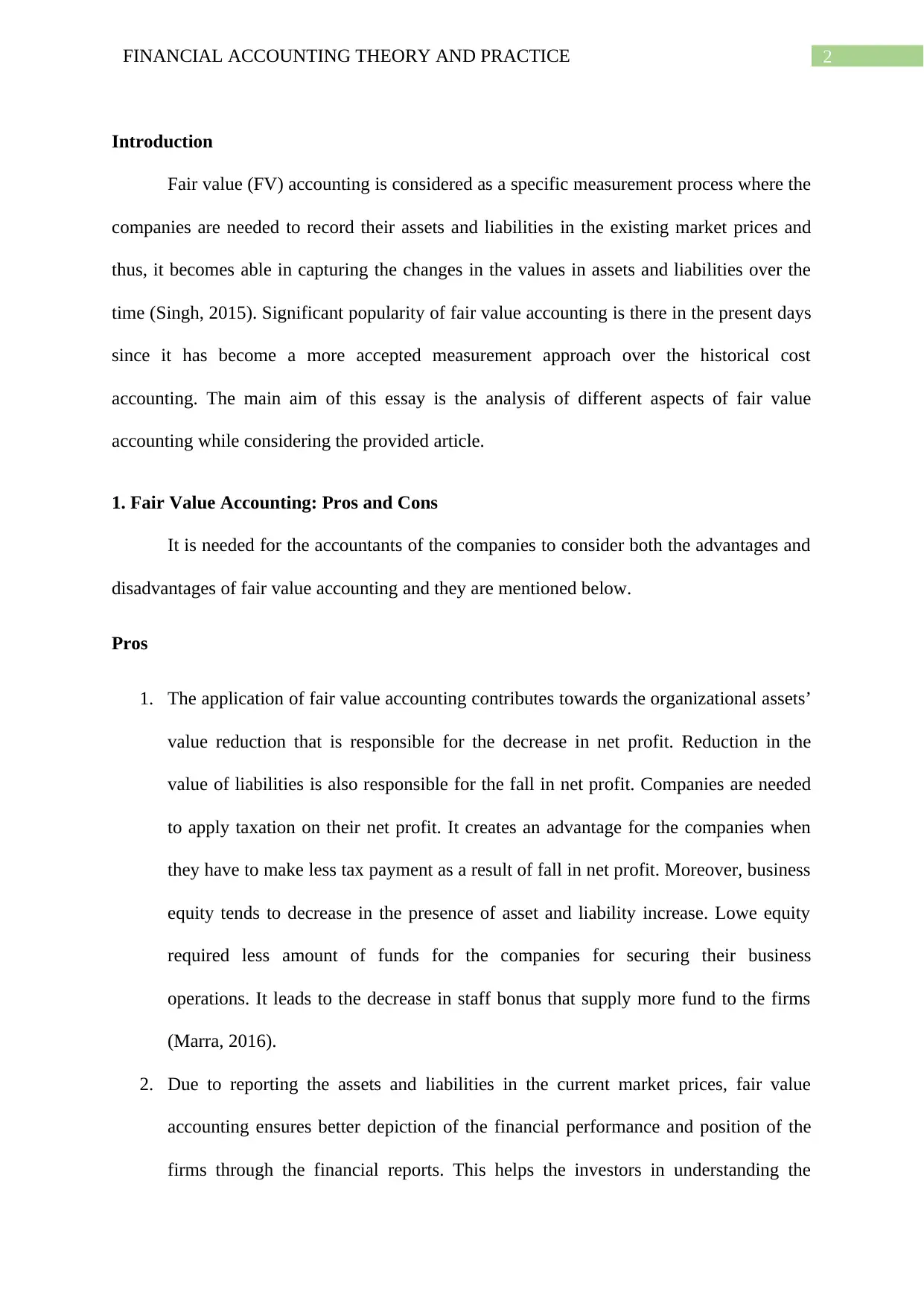
2FINANCIAL ACCOUNTING THEORY AND PRACTICE
Introduction
Fair value (FV) accounting is considered as a specific measurement process where the
companies are needed to record their assets and liabilities in the existing market prices and
thus, it becomes able in capturing the changes in the values in assets and liabilities over the
time (Singh, 2015). Significant popularity of fair value accounting is there in the present days
since it has become a more accepted measurement approach over the historical cost
accounting. The main aim of this essay is the analysis of different aspects of fair value
accounting while considering the provided article.
1. Fair Value Accounting: Pros and Cons
It is needed for the accountants of the companies to consider both the advantages and
disadvantages of fair value accounting and they are mentioned below.
Pros
1. The application of fair value accounting contributes towards the organizational assets’
value reduction that is responsible for the decrease in net profit. Reduction in the
value of liabilities is also responsible for the fall in net profit. Companies are needed
to apply taxation on their net profit. It creates an advantage for the companies when
they have to make less tax payment as a result of fall in net profit. Moreover, business
equity tends to decrease in the presence of asset and liability increase. Lowe equity
required less amount of funds for the companies for securing their business
operations. It leads to the decrease in staff bonus that supply more fund to the firms
(Marra, 2016).
2. Due to reporting the assets and liabilities in the current market prices, fair value
accounting ensures better depiction of the financial performance and position of the
firms through the financial reports. This helps the investors in understanding the
Introduction
Fair value (FV) accounting is considered as a specific measurement process where the
companies are needed to record their assets and liabilities in the existing market prices and
thus, it becomes able in capturing the changes in the values in assets and liabilities over the
time (Singh, 2015). Significant popularity of fair value accounting is there in the present days
since it has become a more accepted measurement approach over the historical cost
accounting. The main aim of this essay is the analysis of different aspects of fair value
accounting while considering the provided article.
1. Fair Value Accounting: Pros and Cons
It is needed for the accountants of the companies to consider both the advantages and
disadvantages of fair value accounting and they are mentioned below.
Pros
1. The application of fair value accounting contributes towards the organizational assets’
value reduction that is responsible for the decrease in net profit. Reduction in the
value of liabilities is also responsible for the fall in net profit. Companies are needed
to apply taxation on their net profit. It creates an advantage for the companies when
they have to make less tax payment as a result of fall in net profit. Moreover, business
equity tends to decrease in the presence of asset and liability increase. Lowe equity
required less amount of funds for the companies for securing their business
operations. It leads to the decrease in staff bonus that supply more fund to the firms
(Marra, 2016).
2. Due to reporting the assets and liabilities in the current market prices, fair value
accounting ensures better depiction of the financial performance and position of the
firms through the financial reports. This helps the investors in understanding the
⊘ This is a preview!⊘
Do you want full access?
Subscribe today to unlock all pages.

Trusted by 1+ million students worldwide
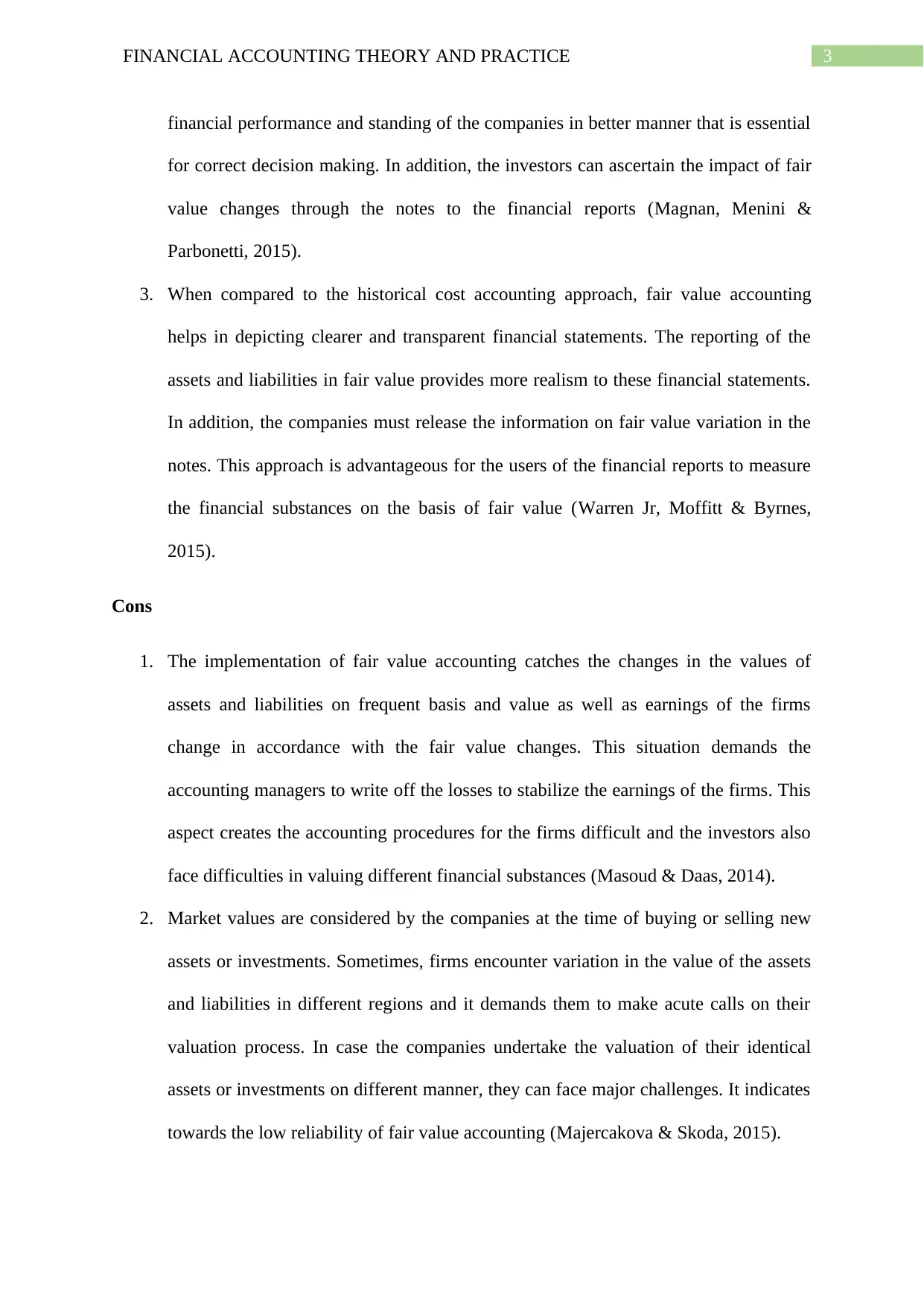
3FINANCIAL ACCOUNTING THEORY AND PRACTICE
financial performance and standing of the companies in better manner that is essential
for correct decision making. In addition, the investors can ascertain the impact of fair
value changes through the notes to the financial reports (Magnan, Menini &
Parbonetti, 2015).
3. When compared to the historical cost accounting approach, fair value accounting
helps in depicting clearer and transparent financial statements. The reporting of the
assets and liabilities in fair value provides more realism to these financial statements.
In addition, the companies must release the information on fair value variation in the
notes. This approach is advantageous for the users of the financial reports to measure
the financial substances on the basis of fair value (Warren Jr, Moffitt & Byrnes,
2015).
Cons
1. The implementation of fair value accounting catches the changes in the values of
assets and liabilities on frequent basis and value as well as earnings of the firms
change in accordance with the fair value changes. This situation demands the
accounting managers to write off the losses to stabilize the earnings of the firms. This
aspect creates the accounting procedures for the firms difficult and the investors also
face difficulties in valuing different financial substances (Masoud & Daas, 2014).
2. Market values are considered by the companies at the time of buying or selling new
assets or investments. Sometimes, firms encounter variation in the value of the assets
and liabilities in different regions and it demands them to make acute calls on their
valuation process. In case the companies undertake the valuation of their identical
assets or investments on different manner, they can face major challenges. It indicates
towards the low reliability of fair value accounting (Majercakova & Skoda, 2015).
financial performance and standing of the companies in better manner that is essential
for correct decision making. In addition, the investors can ascertain the impact of fair
value changes through the notes to the financial reports (Magnan, Menini &
Parbonetti, 2015).
3. When compared to the historical cost accounting approach, fair value accounting
helps in depicting clearer and transparent financial statements. The reporting of the
assets and liabilities in fair value provides more realism to these financial statements.
In addition, the companies must release the information on fair value variation in the
notes. This approach is advantageous for the users of the financial reports to measure
the financial substances on the basis of fair value (Warren Jr, Moffitt & Byrnes,
2015).
Cons
1. The implementation of fair value accounting catches the changes in the values of
assets and liabilities on frequent basis and value as well as earnings of the firms
change in accordance with the fair value changes. This situation demands the
accounting managers to write off the losses to stabilize the earnings of the firms. This
aspect creates the accounting procedures for the firms difficult and the investors also
face difficulties in valuing different financial substances (Masoud & Daas, 2014).
2. Market values are considered by the companies at the time of buying or selling new
assets or investments. Sometimes, firms encounter variation in the value of the assets
and liabilities in different regions and it demands them to make acute calls on their
valuation process. In case the companies undertake the valuation of their identical
assets or investments on different manner, they can face major challenges. It indicates
towards the low reliability of fair value accounting (Majercakova & Skoda, 2015).
Paraphrase This Document
Need a fresh take? Get an instant paraphrase of this document with our AI Paraphraser
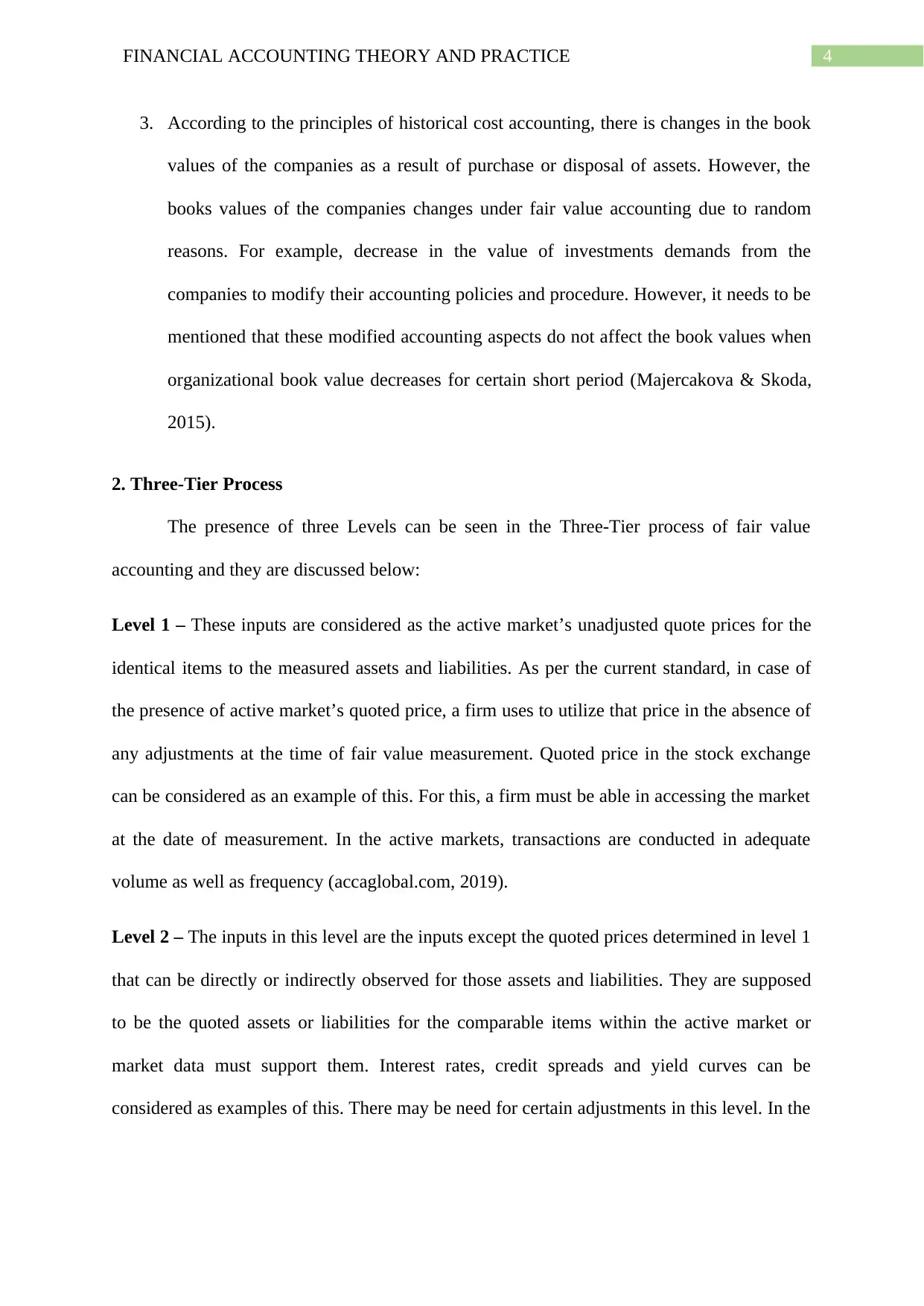
4FINANCIAL ACCOUNTING THEORY AND PRACTICE
3. According to the principles of historical cost accounting, there is changes in the book
values of the companies as a result of purchase or disposal of assets. However, the
books values of the companies changes under fair value accounting due to random
reasons. For example, decrease in the value of investments demands from the
companies to modify their accounting policies and procedure. However, it needs to be
mentioned that these modified accounting aspects do not affect the book values when
organizational book value decreases for certain short period (Majercakova & Skoda,
2015).
2. Three-Tier Process
The presence of three Levels can be seen in the Three-Tier process of fair value
accounting and they are discussed below:
Level 1 – These inputs are considered as the active market’s unadjusted quote prices for the
identical items to the measured assets and liabilities. As per the current standard, in case of
the presence of active market’s quoted price, a firm uses to utilize that price in the absence of
any adjustments at the time of fair value measurement. Quoted price in the stock exchange
can be considered as an example of this. For this, a firm must be able in accessing the market
at the date of measurement. In the active markets, transactions are conducted in adequate
volume as well as frequency (accaglobal.com, 2019).
Level 2 – The inputs in this level are the inputs except the quoted prices determined in level 1
that can be directly or indirectly observed for those assets and liabilities. They are supposed
to be the quoted assets or liabilities for the comparable items within the active market or
market data must support them. Interest rates, credit spreads and yield curves can be
considered as examples of this. There may be need for certain adjustments in this level. In the
3. According to the principles of historical cost accounting, there is changes in the book
values of the companies as a result of purchase or disposal of assets. However, the
books values of the companies changes under fair value accounting due to random
reasons. For example, decrease in the value of investments demands from the
companies to modify their accounting policies and procedure. However, it needs to be
mentioned that these modified accounting aspects do not affect the book values when
organizational book value decreases for certain short period (Majercakova & Skoda,
2015).
2. Three-Tier Process
The presence of three Levels can be seen in the Three-Tier process of fair value
accounting and they are discussed below:
Level 1 – These inputs are considered as the active market’s unadjusted quote prices for the
identical items to the measured assets and liabilities. As per the current standard, in case of
the presence of active market’s quoted price, a firm uses to utilize that price in the absence of
any adjustments at the time of fair value measurement. Quoted price in the stock exchange
can be considered as an example of this. For this, a firm must be able in accessing the market
at the date of measurement. In the active markets, transactions are conducted in adequate
volume as well as frequency (accaglobal.com, 2019).
Level 2 – The inputs in this level are the inputs except the quoted prices determined in level 1
that can be directly or indirectly observed for those assets and liabilities. They are supposed
to be the quoted assets or liabilities for the comparable items within the active market or
market data must support them. Interest rates, credit spreads and yield curves can be
considered as examples of this. There may be need for certain adjustments in this level. In the
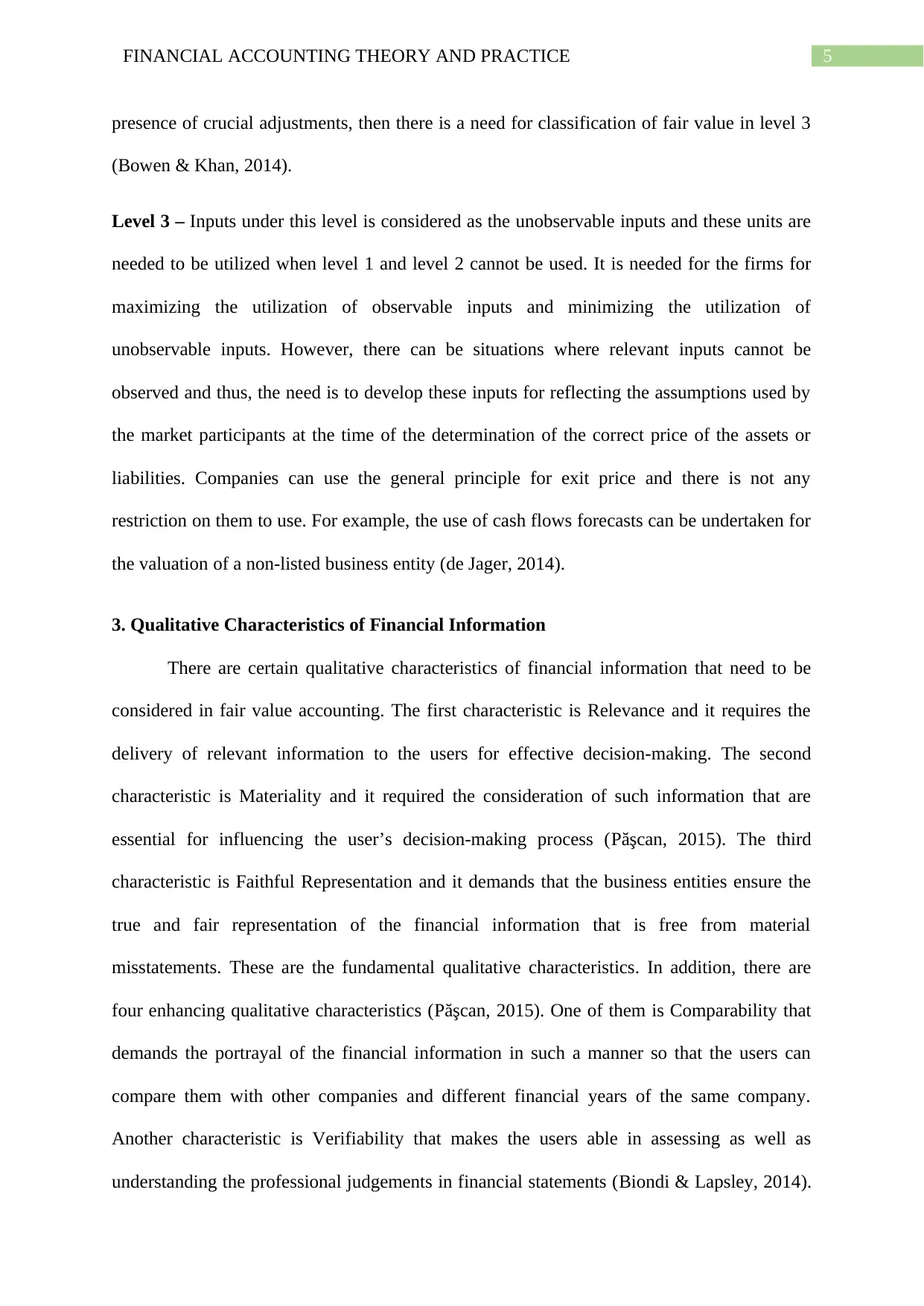
5FINANCIAL ACCOUNTING THEORY AND PRACTICE
presence of crucial adjustments, then there is a need for classification of fair value in level 3
(Bowen & Khan, 2014).
Level 3 – Inputs under this level is considered as the unobservable inputs and these units are
needed to be utilized when level 1 and level 2 cannot be used. It is needed for the firms for
maximizing the utilization of observable inputs and minimizing the utilization of
unobservable inputs. However, there can be situations where relevant inputs cannot be
observed and thus, the need is to develop these inputs for reflecting the assumptions used by
the market participants at the time of the determination of the correct price of the assets or
liabilities. Companies can use the general principle for exit price and there is not any
restriction on them to use. For example, the use of cash flows forecasts can be undertaken for
the valuation of a non-listed business entity (de Jager, 2014).
3. Qualitative Characteristics of Financial Information
There are certain qualitative characteristics of financial information that need to be
considered in fair value accounting. The first characteristic is Relevance and it requires the
delivery of relevant information to the users for effective decision-making. The second
characteristic is Materiality and it required the consideration of such information that are
essential for influencing the user’s decision-making process (Păşcan, 2015). The third
characteristic is Faithful Representation and it demands that the business entities ensure the
true and fair representation of the financial information that is free from material
misstatements. These are the fundamental qualitative characteristics. In addition, there are
four enhancing qualitative characteristics (Păşcan, 2015). One of them is Comparability that
demands the portrayal of the financial information in such a manner so that the users can
compare them with other companies and different financial years of the same company.
Another characteristic is Verifiability that makes the users able in assessing as well as
understanding the professional judgements in financial statements (Biondi & Lapsley, 2014).
presence of crucial adjustments, then there is a need for classification of fair value in level 3
(Bowen & Khan, 2014).
Level 3 – Inputs under this level is considered as the unobservable inputs and these units are
needed to be utilized when level 1 and level 2 cannot be used. It is needed for the firms for
maximizing the utilization of observable inputs and minimizing the utilization of
unobservable inputs. However, there can be situations where relevant inputs cannot be
observed and thus, the need is to develop these inputs for reflecting the assumptions used by
the market participants at the time of the determination of the correct price of the assets or
liabilities. Companies can use the general principle for exit price and there is not any
restriction on them to use. For example, the use of cash flows forecasts can be undertaken for
the valuation of a non-listed business entity (de Jager, 2014).
3. Qualitative Characteristics of Financial Information
There are certain qualitative characteristics of financial information that need to be
considered in fair value accounting. The first characteristic is Relevance and it requires the
delivery of relevant information to the users for effective decision-making. The second
characteristic is Materiality and it required the consideration of such information that are
essential for influencing the user’s decision-making process (Păşcan, 2015). The third
characteristic is Faithful Representation and it demands that the business entities ensure the
true and fair representation of the financial information that is free from material
misstatements. These are the fundamental qualitative characteristics. In addition, there are
four enhancing qualitative characteristics (Păşcan, 2015). One of them is Comparability that
demands the portrayal of the financial information in such a manner so that the users can
compare them with other companies and different financial years of the same company.
Another characteristic is Verifiability that makes the users able in assessing as well as
understanding the professional judgements in financial statements (Biondi & Lapsley, 2014).
⊘ This is a preview!⊘
Do you want full access?
Subscribe today to unlock all pages.

Trusted by 1+ million students worldwide
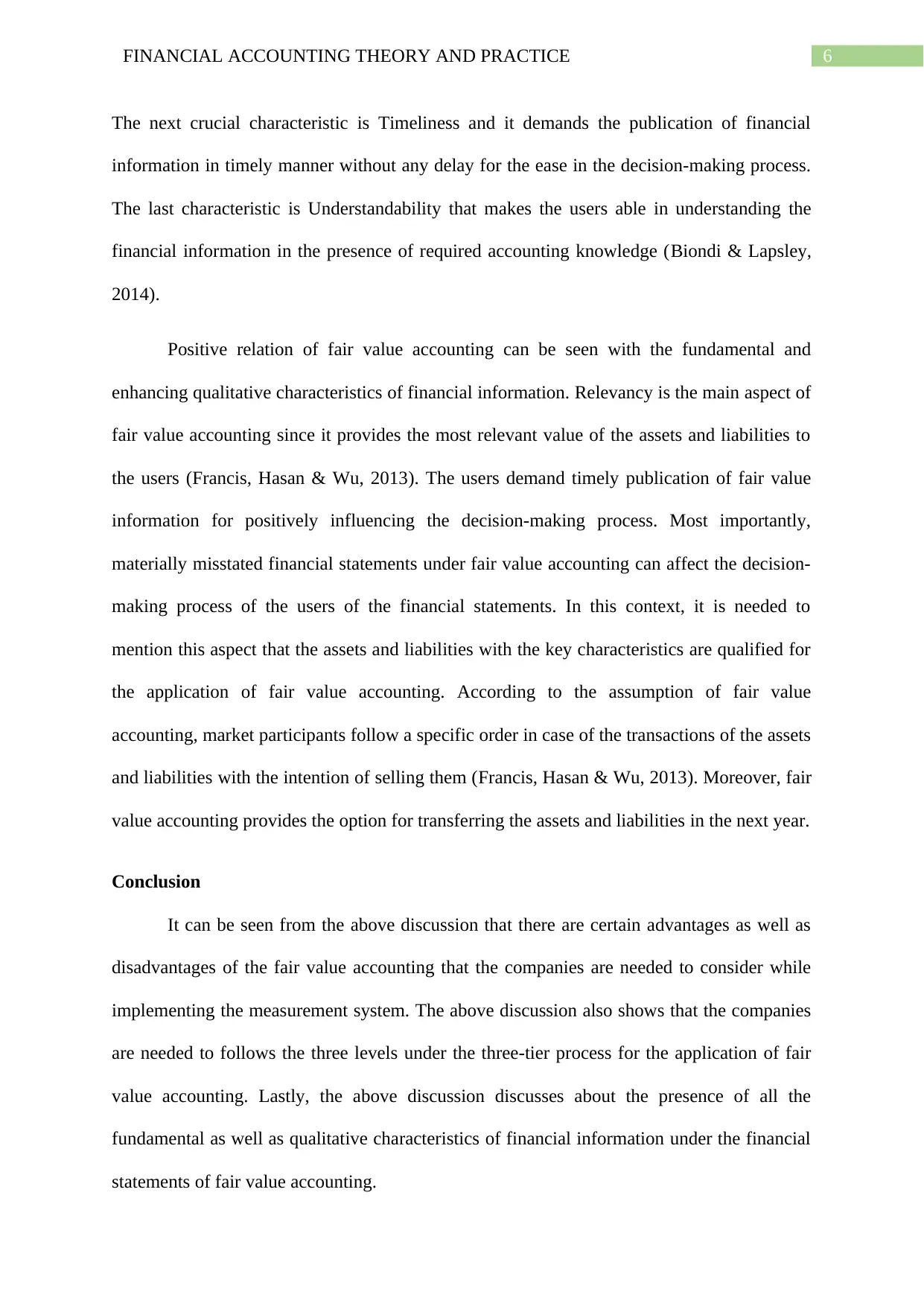
6FINANCIAL ACCOUNTING THEORY AND PRACTICE
The next crucial characteristic is Timeliness and it demands the publication of financial
information in timely manner without any delay for the ease in the decision-making process.
The last characteristic is Understandability that makes the users able in understanding the
financial information in the presence of required accounting knowledge (Biondi & Lapsley,
2014).
Positive relation of fair value accounting can be seen with the fundamental and
enhancing qualitative characteristics of financial information. Relevancy is the main aspect of
fair value accounting since it provides the most relevant value of the assets and liabilities to
the users (Francis, Hasan & Wu, 2013). The users demand timely publication of fair value
information for positively influencing the decision-making process. Most importantly,
materially misstated financial statements under fair value accounting can affect the decision-
making process of the users of the financial statements. In this context, it is needed to
mention this aspect that the assets and liabilities with the key characteristics are qualified for
the application of fair value accounting. According to the assumption of fair value
accounting, market participants follow a specific order in case of the transactions of the assets
and liabilities with the intention of selling them (Francis, Hasan & Wu, 2013). Moreover, fair
value accounting provides the option for transferring the assets and liabilities in the next year.
Conclusion
It can be seen from the above discussion that there are certain advantages as well as
disadvantages of the fair value accounting that the companies are needed to consider while
implementing the measurement system. The above discussion also shows that the companies
are needed to follows the three levels under the three-tier process for the application of fair
value accounting. Lastly, the above discussion discusses about the presence of all the
fundamental as well as qualitative characteristics of financial information under the financial
statements of fair value accounting.
The next crucial characteristic is Timeliness and it demands the publication of financial
information in timely manner without any delay for the ease in the decision-making process.
The last characteristic is Understandability that makes the users able in understanding the
financial information in the presence of required accounting knowledge (Biondi & Lapsley,
2014).
Positive relation of fair value accounting can be seen with the fundamental and
enhancing qualitative characteristics of financial information. Relevancy is the main aspect of
fair value accounting since it provides the most relevant value of the assets and liabilities to
the users (Francis, Hasan & Wu, 2013). The users demand timely publication of fair value
information for positively influencing the decision-making process. Most importantly,
materially misstated financial statements under fair value accounting can affect the decision-
making process of the users of the financial statements. In this context, it is needed to
mention this aspect that the assets and liabilities with the key characteristics are qualified for
the application of fair value accounting. According to the assumption of fair value
accounting, market participants follow a specific order in case of the transactions of the assets
and liabilities with the intention of selling them (Francis, Hasan & Wu, 2013). Moreover, fair
value accounting provides the option for transferring the assets and liabilities in the next year.
Conclusion
It can be seen from the above discussion that there are certain advantages as well as
disadvantages of the fair value accounting that the companies are needed to consider while
implementing the measurement system. The above discussion also shows that the companies
are needed to follows the three levels under the three-tier process for the application of fair
value accounting. Lastly, the above discussion discusses about the presence of all the
fundamental as well as qualitative characteristics of financial information under the financial
statements of fair value accounting.
Paraphrase This Document
Need a fresh take? Get an instant paraphrase of this document with our AI Paraphraser

7FINANCIAL ACCOUNTING THEORY AND PRACTICE
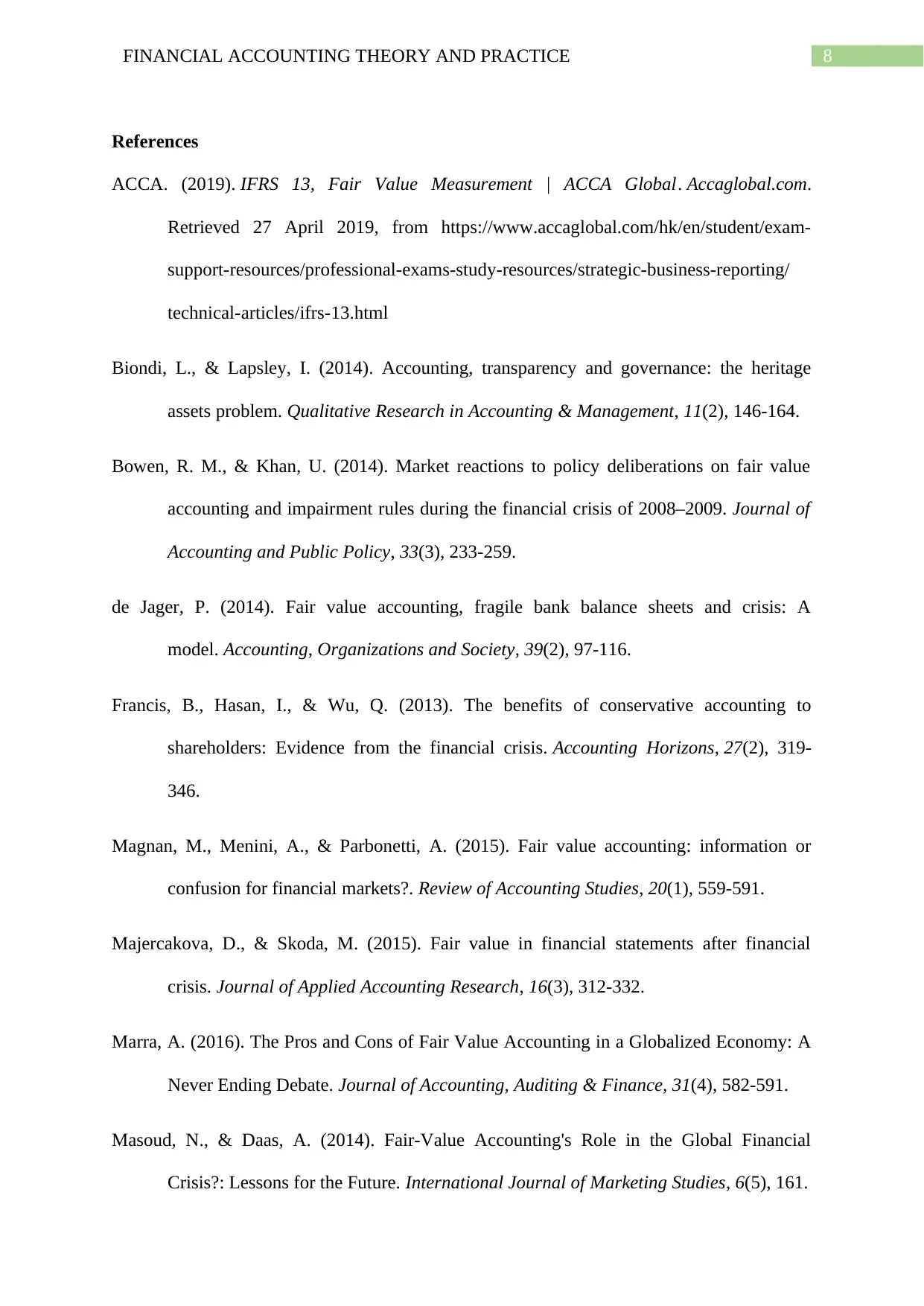
8FINANCIAL ACCOUNTING THEORY AND PRACTICE
References
ACCA. (2019). IFRS 13, Fair Value Measurement | ACCA Global. Accaglobal.com.
Retrieved 27 April 2019, from https://www.accaglobal.com/hk/en/student/exam-
support-resources/professional-exams-study-resources/strategic-business-reporting/
technical-articles/ifrs-13.html
Biondi, L., & Lapsley, I. (2014). Accounting, transparency and governance: the heritage
assets problem. Qualitative Research in Accounting & Management, 11(2), 146-164.
Bowen, R. M., & Khan, U. (2014). Market reactions to policy deliberations on fair value
accounting and impairment rules during the financial crisis of 2008–2009. Journal of
Accounting and Public Policy, 33(3), 233-259.
de Jager, P. (2014). Fair value accounting, fragile bank balance sheets and crisis: A
model. Accounting, Organizations and Society, 39(2), 97-116.
Francis, B., Hasan, I., & Wu, Q. (2013). The benefits of conservative accounting to
shareholders: Evidence from the financial crisis. Accounting Horizons, 27(2), 319-
346.
Magnan, M., Menini, A., & Parbonetti, A. (2015). Fair value accounting: information or
confusion for financial markets?. Review of Accounting Studies, 20(1), 559-591.
Majercakova, D., & Skoda, M. (2015). Fair value in financial statements after financial
crisis. Journal of Applied Accounting Research, 16(3), 312-332.
Marra, A. (2016). The Pros and Cons of Fair Value Accounting in a Globalized Economy: A
Never Ending Debate. Journal of Accounting, Auditing & Finance, 31(4), 582-591.
Masoud, N., & Daas, A. (2014). Fair-Value Accounting's Role in the Global Financial
Crisis?: Lessons for the Future. International Journal of Marketing Studies, 6(5), 161.
References
ACCA. (2019). IFRS 13, Fair Value Measurement | ACCA Global. Accaglobal.com.
Retrieved 27 April 2019, from https://www.accaglobal.com/hk/en/student/exam-
support-resources/professional-exams-study-resources/strategic-business-reporting/
technical-articles/ifrs-13.html
Biondi, L., & Lapsley, I. (2014). Accounting, transparency and governance: the heritage
assets problem. Qualitative Research in Accounting & Management, 11(2), 146-164.
Bowen, R. M., & Khan, U. (2014). Market reactions to policy deliberations on fair value
accounting and impairment rules during the financial crisis of 2008–2009. Journal of
Accounting and Public Policy, 33(3), 233-259.
de Jager, P. (2014). Fair value accounting, fragile bank balance sheets and crisis: A
model. Accounting, Organizations and Society, 39(2), 97-116.
Francis, B., Hasan, I., & Wu, Q. (2013). The benefits of conservative accounting to
shareholders: Evidence from the financial crisis. Accounting Horizons, 27(2), 319-
346.
Magnan, M., Menini, A., & Parbonetti, A. (2015). Fair value accounting: information or
confusion for financial markets?. Review of Accounting Studies, 20(1), 559-591.
Majercakova, D., & Skoda, M. (2015). Fair value in financial statements after financial
crisis. Journal of Applied Accounting Research, 16(3), 312-332.
Marra, A. (2016). The Pros and Cons of Fair Value Accounting in a Globalized Economy: A
Never Ending Debate. Journal of Accounting, Auditing & Finance, 31(4), 582-591.
Masoud, N., & Daas, A. (2014). Fair-Value Accounting's Role in the Global Financial
Crisis?: Lessons for the Future. International Journal of Marketing Studies, 6(5), 161.
⊘ This is a preview!⊘
Do you want full access?
Subscribe today to unlock all pages.

Trusted by 1+ million students worldwide
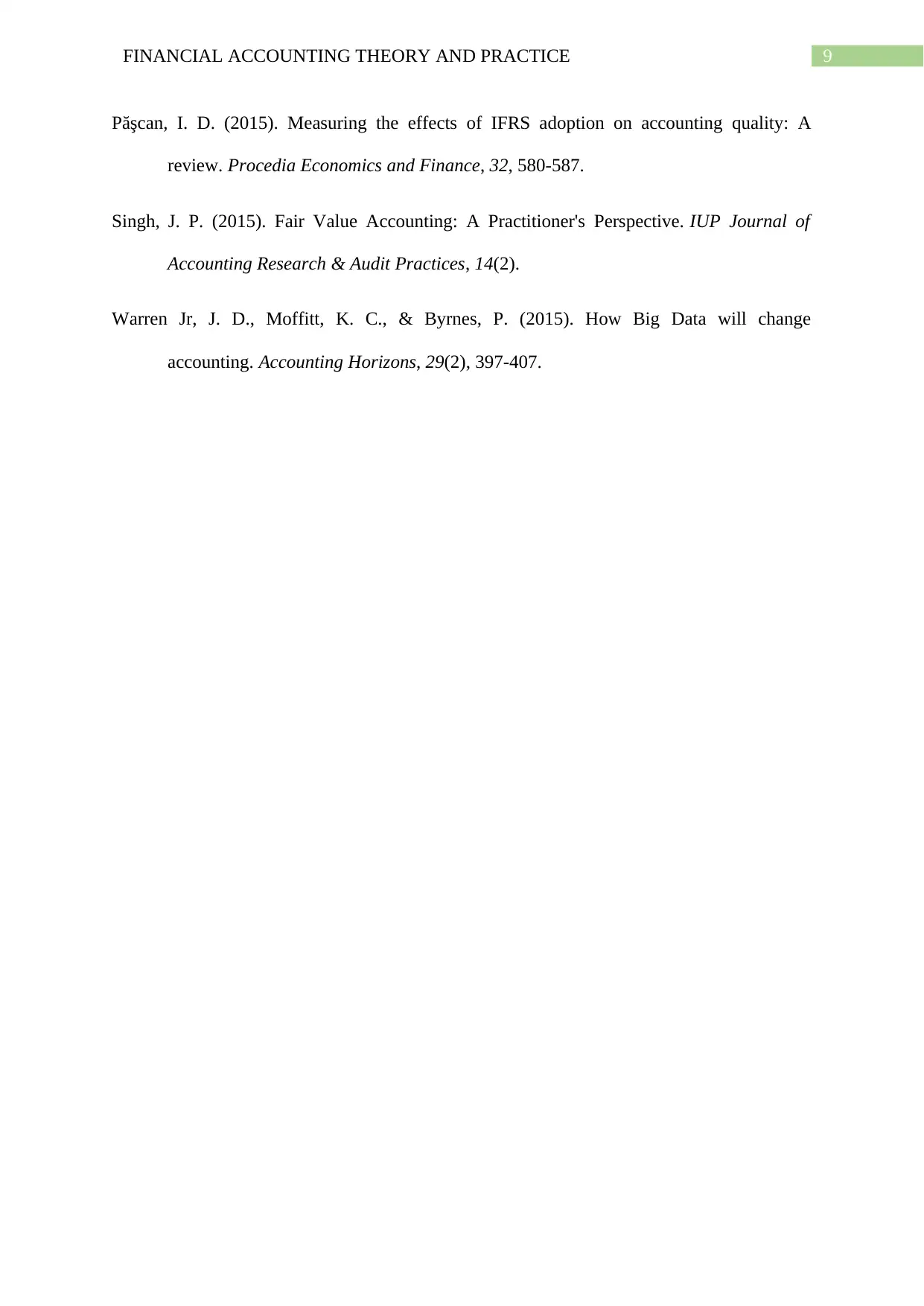
9FINANCIAL ACCOUNTING THEORY AND PRACTICE
Păşcan, I. D. (2015). Measuring the effects of IFRS adoption on accounting quality: A
review. Procedia Economics and Finance, 32, 580-587.
Singh, J. P. (2015). Fair Value Accounting: A Practitioner's Perspective. IUP Journal of
Accounting Research & Audit Practices, 14(2).
Warren Jr, J. D., Moffitt, K. C., & Byrnes, P. (2015). How Big Data will change
accounting. Accounting Horizons, 29(2), 397-407.
Păşcan, I. D. (2015). Measuring the effects of IFRS adoption on accounting quality: A
review. Procedia Economics and Finance, 32, 580-587.
Singh, J. P. (2015). Fair Value Accounting: A Practitioner's Perspective. IUP Journal of
Accounting Research & Audit Practices, 14(2).
Warren Jr, J. D., Moffitt, K. C., & Byrnes, P. (2015). How Big Data will change
accounting. Accounting Horizons, 29(2), 397-407.
1 out of 10
Related Documents
Your All-in-One AI-Powered Toolkit for Academic Success.
+13062052269
info@desklib.com
Available 24*7 on WhatsApp / Email
![[object Object]](/_next/static/media/star-bottom.7253800d.svg)
Unlock your academic potential
© 2024 | Zucol Services PVT LTD | All rights reserved.




